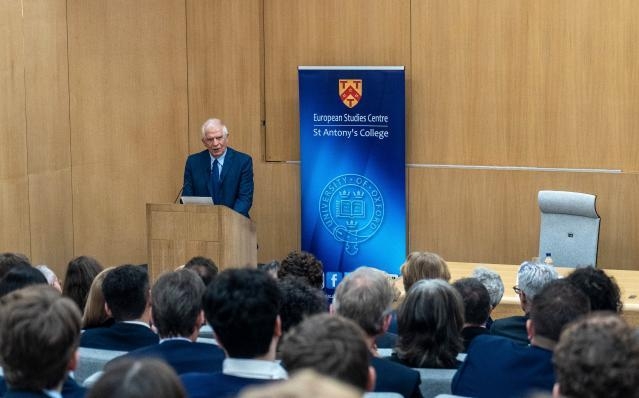59
Borrell speaks about global changes and challenges
www.commonspace.euEU High Representative for Foreign and Security Policy, Josep Borrell, delivered an important policy speech on Friday 3 May during which he did a wide tour d'horizon of the current global situation and the challenges it flags up for Europe and for the world. Speaking in an academic setting, delivering the Dahrendorf Lecture at St Antony's College Oxford, Borrell spoke of a world where there is much more confrontation than co-operation, where there is more polarity and less multilateralism, Borrell spoke about the diminishing role of the United States as world hegemon and the rise of China. We, Europeans, wanted to create in our neighbourhood a ring of friends. Instead of that, what we have today is a ring of fire. A ring of fire coming from the Sahel to the Middle East, the Caucasus and now in the battlefields of Ukraine, the High Representative said: Speaking on Russia, Borrell said Under Putin’s leadership, Russia has returned to the imperialist understanding of the world. Imperial Russia from the Tzar times and the Soviet empire times have been rehabilitated by Putin dreaming of a former size and influence. "It was Georgia in 2008. It was Crimea in 2014. We did not see, or we did not want to see, the evolution of Russia under Putin’s watch. Even though Putin himself had warned us at the Munich Security Conference in 2007. It is important to re-read what Putin said in 2007 at the Munich [Security] Conference that I am afraid that nobody wanted to hear or to understand." Borell described Putin as "an existential threat". In his speech Borell dwelt on the wars in Ukraine and in Gaza. "Now, we have two wars. And we, Europeans, are not prepared for the harshness of the world." The High Representative said that the way of living of the Europeans, "this best combination of political freedom, economic prosperity and social cohesion that the humanity has never been able to invent, is certainly in danger. And in order to face these challenges, I think that we have to work on three dimensions: Principles, Cooperation and Strength."



That’s the thing, Putin would accept being allowed “into the club” in a heartbeat. These euros see Putin as an existential threat but they refuse to do the one that thing would actually defuse the situation - bring Russia closer to them. Neoliberalism can’t allow Russia to be an equal - they’re too much of a threat to US hegemony just by sheer size and power, even if they earnestly want to play ball with the west. It took Putin a while to realize this but I think he gets it now.
By the way isn’t Borrell the guy who made that infamous “garden” comment?
deleted by creator
This is the endgame from 30 years of mishandling the unwinding of the USSR.
The obvious answer was to follow the post-WWII playbook: welcome Russia with open arms and flood them with redevelopment aid, like Germany and Japan. Provide a soft landing for Ivan Ivanovich-- maybe enabled by a rush of cheap, available consumer goods or some temporary market supports-- and it's much harder to make a political message out of "were you better off before 1991?". Give them 20 years to willingly unwind their military presence and become economically dependent, and you'd buy an endless stream of Yeltsin-esque stooges that would greenlight the slow parasitization of the country.
That would have required delayed gratification though: you probably couldn't push the privatization grift immediately, for example.